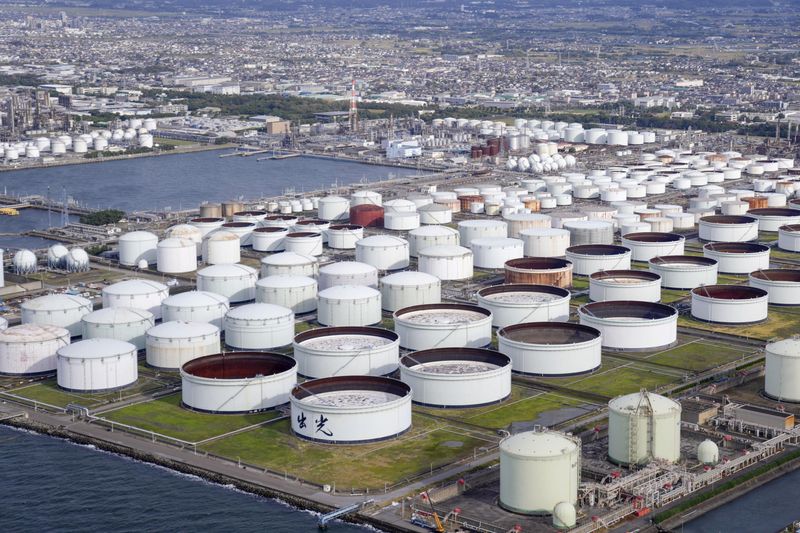By Arathy Somasekhar
(Reuters) -Oil prices were little changed on Wednesday, pressured by a big surprise increase in U.S. gasoline inventories and concerns about U.S. interest rate cuts next year, but prices were supported by worries about reduced supply following a ceasefire between Israel and Hezbollah.
futures closed 2 cents higher at $72.83 a barrel. U.S. West Texas Intermediate crude fell 5 cents to $68.72.
U.S. gasoline inventories rose 3.3 million barrels in the week to 212.2 million barrels, the Energy Information Administration said, contradicting analysts’ expectations in a Reuters poll for a decline of 46,000 barrels.
Crude stocks fell 1.8 million barrels in the week ending Nov. 22, the EIA added, easily exceeding analyst expectations in a Reuters poll for a decline of 605,000 barrels.
Market sources, citing the American Petroleum Institute, had said on Tuesday that oil inventories fell by 5.94 million barrels last week and fuel inventories rose.
“It’s surprising to see gasoline inventories increasing so much and implied demand not really increasing week over week given expected record travel this Thanksgiving,” said Matt Smith, an analyst at Kpler.
Oil prices were also hit by U.S. data showing that progress in reducing inflation appears to have stalled in recent months, which could reduce the Federal Reserve’s options for cutting rates in 2025.
Traders added that the U.S. central bank will cut borrowing costs by 25 basis points at its Dec. 17-18 meeting, according to CME Group’s (NASDAQ:) FedWatch tool. However, they expect the Fed to leave rates unchanged at its meetings in January and March.
Slower-than-expected rate cuts would keep borrowing costs high, which could slow economic activity and dampen oil demand.
Both oil benchmarks fell lower on Tuesday after Israel agreed to a ceasefire deal with Lebanon’s Hezbollah group, which took effect on Wednesday after both sides accepted the deal brokered by the US and France. The ceasefire came into effect on Wednesday.
“The real question will be how long the ceasefire will actually be observed,” said Dennis Kissler, senior vice president of trading at BOK Financial.
Oil received support after sources from the OPEC+ group, which includes the Organization of the Petroleum Exporting Countries and allies led by Russia, said it was discussing a further slowdown in oil production increases for January.
The group, which produces about half the world’s oil, had aimed to gradually ease production cuts through 2024 and 2025, but weaker global demand and rising production outside OPEC+ have thrown that plan into doubt. The decision will be made at a December 1 meeting.
The heads of commodity research at Goldman Sachs and Morgan Stanley (NYSE:) said oil prices are undervalued, citing a market shortage and a risk to Iranian supply due to possible sanctions when newly elected US President Donald Trump takes office.

Sources also told Reuters on Tuesday that this would not be exempt from the 25% tariffs Trump has threatened to impose on all products entering the US from Mexico and Canada.
Oil industry analysts and traders warned that the move would likely increase oil prices for U.S. refineries, squeezing margins and raising fuel costs.


